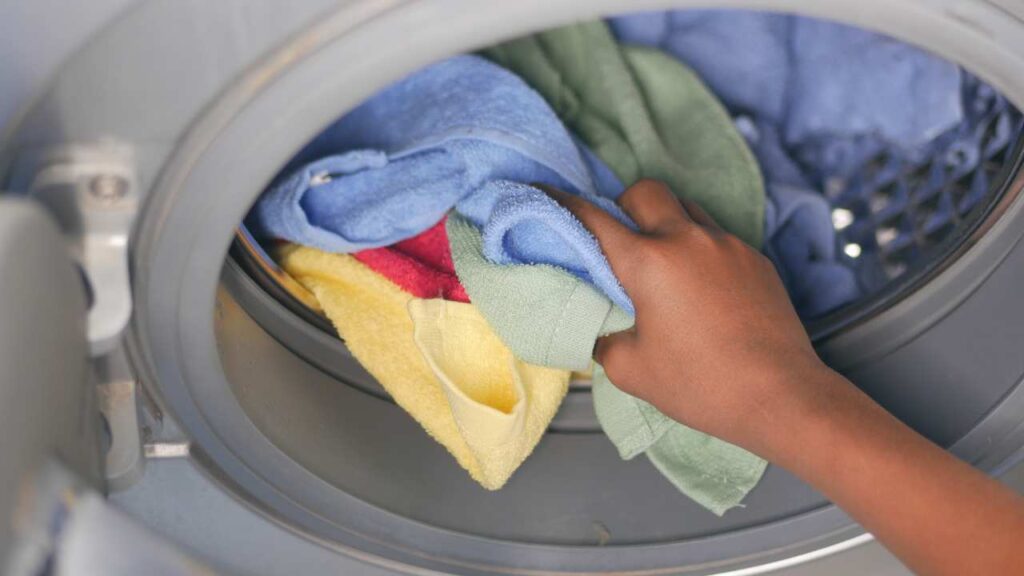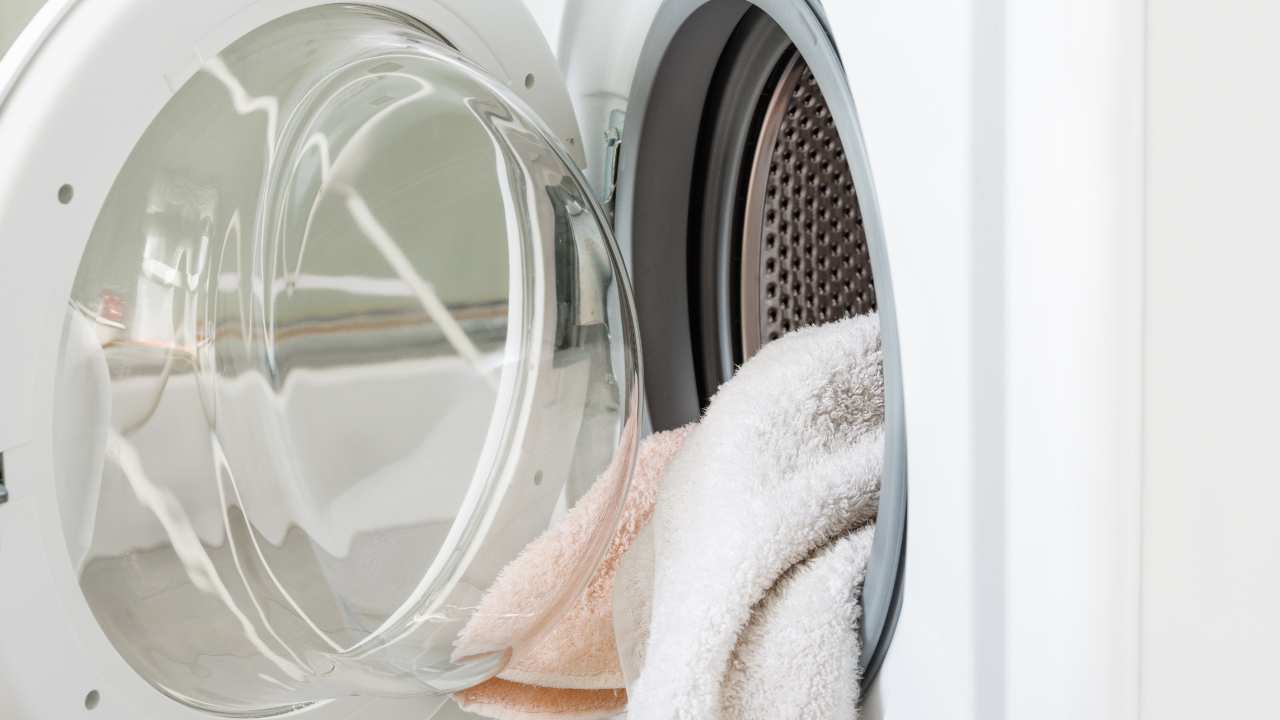How Often Should You Wash Towels And Sheets?
Towels should be washed after three to four uses, while sheets require washing every one to two weeks. Maintaining cleanliness in your home includes regular laundering of towels and sheets.
Taking proper care of your linens ensures that your sleep environment remains hygienic and can contribute to better sleep quality.
It also helps in eliminating bacteria, allergens, and dust mites that tend to accumulate in these fabrics over time.
Frequent washing also preserves your linens, allowing them to provide comfort and last longer.
Creating a wash schedule can simplify the task, ensuring that you always have fresh towels and sheets available.
Remember, it’s not just about washing frequency; it’s also crucial to follow care instructions for temperature and detergents to keep your linens in the best condition.
The Importance Of Clean Bedding And Towels

Imagine wrapping yourself in a fresh, clean towel or slipping between soft, hygienic sheets.
Keeping bedding and towels clean isn’t just a matter of good housekeeping;
it’s essential for your health and well-being.
Over time, fabrics can harbor sweat, body oils, and skin cells.
A regular cleaning schedule ensures a clean environment for rest and relaxation.
Health Benefits Of Regular Washing
Clean sheets and towels contribute to better skin health,
reduce the risk of infections, and offer a sense of comfort. Wash bedding once every week
and towels after three to four uses. This habit removes bacteria and keeps your sleep space fresh.
- Avoid skin irritations: Regular washing removes irritants that can cause discomfort.
- Prevent infections: Bacteria and other microbes can thrive in unwashed fabrics.
- Improve sleep quality: A clean bed ensures a better night’s rest.
Dust Mites And Allergens: The Invisible Threat
Dust mites and allergens are tiny, unseen enemies that live in bedding and towels.
These organisms feed on dead skin cells and thrive in damp environments.
Regular laundering in hot water helps to kill dust mites and remove allergens,

ensuring your sleeping area and bathroom are healthy spaces.
| Action | Benefit |
|---|---|
| Wash at high temperatures | Kills dust mites |
| Use allergen-proof covers | Minimizes exposure to allergens |
| Dry thoroughly | Prevents mold growth |
How Dirty Do Your Sheets And Towels Really Get?
Ever wonder about the cleanliness of your towels and sheets?
While they may look clean, these everyday items can harbor a surprising amount of dirt and grime.
Understanding what builds up in the fibers can help determine how often they need a thorough wash. Let’s delve into the details.
Sweat, Oils, And Skin Cells: A Closer Look
Each night, a person sheds around 15 million skin cells, which can accumulate in bed sheets.
Along with these skin cells, sweat and body oils seep into the fabric.
Over time, this can lead to discoloration and a musty smell, signaling it’s time for a wash.
- Skin cells attract dust mites, which can cause allergies.
- Body oils and sweat may degrade fabric fibers over time.
- Regular laundering maintains the fresh feel and extends the life of your linens.
Bacteria Buildup In A Week’s Time
Imagine the number of bacteria that could grow in a week on a damp towel.
Dampness is a breeding ground for bacteria, leading to unpleasant odors and potential health risks.

It is vital to dry towels properly after each use and wash them regularly to prevent bacteria proliferation.
| Day | Bacteria Status |
|---|---|
| Day 1 | Few bacteria, towel feels fresh |
| Day 3 | Noticeable mustiness, bacteria increase |
| Day 7 | High bacteria content, towel needs wash |
Weekly washing is the minimum standard to keep towels hygienic.
In case of frequent use or in humid environments, more frequent laundering may be necessary.
The Ideal Washing Frequency For Towels
Knowing the right time to wash your towels is key to hygiene and comfort.
Regularly cleaned towels stay fresh and absorbent.
Usage Patterns And Their Impact
Different households have different towel usage habits that dictate washing frequency.
- Single use: Wash after one use for guests or in sickness.
- Daily users: Consider laundering every three to four uses.
- Workout towels: Wash after every session due to sweat build-up.
Usage frequency goes hand in hand with the environment.
- Damp bathrooms require more frequent washes.
- In dry environments, you may stretch this a bit longer.
Signs It’s Time To Launder
Look for clear indicators that your towels need a wash for optimal hygiene.
- Odor: A musty or sour smell is a sure sign.
- Stiffness: Towels feeling less fluffy and more rough show residue build-up.
- Discoloration: Long-standing stains suggest it’s time for a deep clean.
Don’t wait until they are unpleasant.
Regular washes keep towels inviting and clean.
Bed Sheets: Striking The Right Balance
Knowing when to wash your bed sheets is key to both comfort and hygiene.
Striking the right balance ensures your sleep haven is both cozy and clean.

A regular washing schedule maintains a fresh bed, but excessive laundering can wear sheets out prematurely.
Let’s find out how to determine the perfect balance and maintain it effortlessly.
Assessing Your Sheet-washing Schedule
Determining the ideal frequency for laundering your sheets is not one-size-fits-all.
Consider factors like usage, climate, and personal habits.
Let’s examine how to assess and establish your optimal sheet-washing routine.
- Weekly washes are standard for many households.
- Bi-weekly schedules may suit less used beds.
- Adjust according to seasonal changes or personal preferences.
Variables Affecting Bed Sheet Cleanliness
Multiple factors contribute to how often you should wash your sheets.
Understanding these variables can help you tailor your approach to bed sheet cleanliness.
| Skin Conditions | Frequent washing may be needed for sensitive skin. |
|---|---|
| Climate | Hotter climates necessitate more regular laundering. |
| Activities | Eating or working in bed means more frequent washes. |
| Pets | Sharing a bed with pets demands additional washes. |
Best Practices For Washing Bedding And Towels
Keeping your towels and sheets clean is essential. It ensures your comfort and hygiene.
Over time, dirt, skin cells, and bacteria can build up.
You can keep your bedding and towels fresh with the right washing habits.
Choosing The Right Detergent And Temperature
Selecting the right detergent is crucial for effective cleaning.
For towels and sheets, choose a detergent that is gentle but effective.
It should remove dirt without harming the fabric.

The water temperature is also key. Warm water is best for most bedding and towels.
It helps to kill germs and remove stains.
- Mild detergents help preserve fabric quality.
- Avoid bleach to prevent weakening fibers unless necessary for whites.
- Some fabrics do well with cold water. Always check the label.
- High temperatures are for deep cleaning and killing mites.
Drying Techniques To Maximize Freshness
Proper drying is as important as washing.
Proper drying techniques eliminate moisture.
prevents mold and mustiness. Freshness is locked in when towels and sheets are dried well.
- Shake out each item before drying. This reduces wrinkles.
- Use a medium heat setting on your dryer or line dry when possible.
- Avoid overloading the dryer. This ensures even drying.
- Consider dryer balls to fluff fabric and reduce drying time.
- Air well if line drying. This prevents damp smells.
Extending Towel And Sheet Lifespans Through Care
Caring for towels and sheets influences their usability and longevity.
Ensuring proper care not only maintains the freshness of these essentials but also extends their life, saving money and resources over time.
Proper Storage Solutions
Effective storage is crucial in extending the life of towels and sheets.
Storing them in a cool, dry place prevents mold and mildew growth.
Before putting away, always ensure they’re completely dry.
Avoid overcrowding shelves as this can cause persistent creases and wear out fabrics.
- Use airy shelving units to avoid moisture buildup.
- Roll towels instead of folding to minimize creases.
- Avoid plastic bins which trap moisture, opt for breathable storage options.
The Dos And Don’ts Of Fabric Softeners
While fabric softeners add a pleasant scent and softness, they may not always be the best choice for towels and sheets.
| Do’s | Don’ts |
|---|---|
| Use sparingly on sheets | Use on microfiber towels |
| Opt for natural alternatives like vinegar | Apply directly to fabrics |
| Follow product instructions carefully | Use in every wash cycle |
Using a small amount with sheets can maintain softness without buildup.

Avoid using softeners on towels, as it affects their absorbency.
Rinse thoroughly to remove any residue that could degrade fabric fibers over time.
When To Replace Your Bedding And Towels
Part of keeping a clean and comfortable home involves knowing when to replace your bedding and towels.
While washing is essential for maintaining hygiene, over time these items will need to be replaced due to wear and deterioration.
Knowing the signs to look out for can ensure you always have fresh and functional linens.
The Telltale Signs Of Wear And Tear
Bedding and towels showcase several clear indicators when they’re past their prime.
Look for the following signs:
- Thinning fabric which makes them more susceptible to holes and tears
- Fraying edges that suggest the material is degrading
- Fading colors or patterns, indicating numerous washes
- Stubborn stains and odors that persist despite thorough cleaning
- Loss of softness in towels, which affects absorbency
Considering Material And Quality In Replacements

Picking the right material and quality is crucial to extend the life of your new linens.
Here’s what to consider:
| Material | Quality | Expected Durability |
|---|---|---|
| Cotton | High-thread-count | Long-lasting comfort |
| Microfiber | Dense weave | Less prone to pilling |
| Linen | Natural fibers | Increases softness over time |
| Bamboo | Organic certifications | Eco-friendly option with durability |
Remember, higher quality doesn’t just provide a better feel;
it also means your bedding and towels will stand the test of time.
Investing in good materials pays off not only in comfort but in longevity as well.
Frequently Asked Questions Of How Often Should You Wash Towels And Sheets
How Often To Launder Bath Towels?
Bath towels should be washed after three to four uses.
If used daily, washing them once a week is recommended.
Proper drying between uses extends time between washes.
Best Frequency For Washing Bed Sheets?
Bed sheets should be washed weekly.
For those with allergies or night sweats, consider washing sheets more frequently, approximately every three to four days, to maintain cleanliness.
Can You Over-wash Towels And Sheets?
Yes, over-washing can cause wear and tear.
Washing towels and sheets only when necessary helps maintain their quality.
Follow care label instructions to prevent damage from excessive laundering.
Do Towels Need Special Laundry Detergent?
No, towels don’t require special detergent, but using a gentle, fragrance-free option can prevent skin irritation.
Avoid fabric softeners, as they can reduce absorbency over time.
Conclusion
Understanding the right frequency to wash sheets and towels ensures cleanliness and longevity.
Aim for a weekly laundry cycle for sheets, while towels may need more frequent cleaning.
Remember, personal usage and season can dictate wash schedules.
Keep them fresh, and they’ll return the favor in comfort and hygiene.

